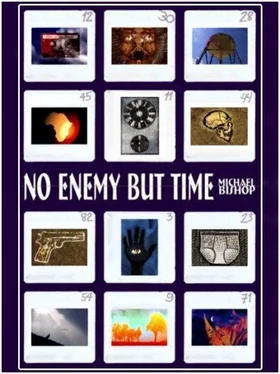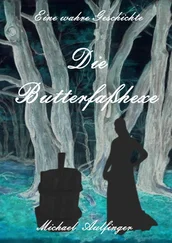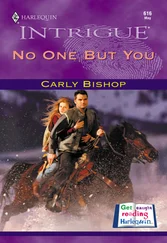Jeannette’s reaction to my vandalism was not what I had expected. After muttering “What the hell” into her cupped hand, she gave me an appraising look, put her fingers into my wiry hair, and pulled my head into the pit of her arm. Although she would not let go, I could tell she was not angry, merely amused by the form my defiance had taken. Anna was the one who got angry. She railed about the time it would take to restore the slides to their sacrosanct order, and she refused to continue the show.
“Damn you, Johnny-boy!” she exclaimed. “You’re going to straighten this out yourself. Don’t expect any help from me .”
“Oh, Anna, it’s all right,” our mother replied. “Go on to the next one.”
“But, Mamma, he’s mixed them all up.”
Jeannette laughed. “But we know what’s what, don’t we? Let’s just run through the lot and enjoy them as they come up.”
“You can’t enjoy them. Somebody who’d never seen them before wouldn’t know what was going on.
They don’t tell a story anymore, they’re just bits and pieces of… of one big mess .”
“But, Anna, the story’s in our heads. It won’t hurt to show them out of sequence. Let’s not worry about some hypothetical somebody who doesn’t even know who we are.”
“Mamma, I’m not going to put them back the way they belong.”
“I don’t want you to. I’ll do it. It won’t be hard. They’re all numbered, anyway. So let’s just go ahead, all right?”
Sullenly, then, Anna showed the slides in all their helter-skelter, heels-over-head, gap-ridden glory, and I was not scolded. And Jeannette had spoken truthfully: The story was in our heads. Each slide evoked its own context. I paid attention to the program—the immutable program implicit even in this crazy shuffling—as I had not paid attention to any of our slides in a very long time. The Monegal Family Experience had taken on new life. My shuffling of images managed to convey nuances that linear sequence could not really communicate. Each click of the changer was a revision and a gloss.
I put my head on my mother’s breast believing that she had finally given in to the randomness of “reality.”
But then I recalled her saying, “They’re all numbered, anyway,” and I saw in the corner of each cardboard mounting the numerals she had scrupulously, minutely, inked there. These were a hedge against forgetfulness, entropy, chaos—but they seriously undercut my appreciation of my mother’s surprising tolerance of my prank. It was easy to be generous of spirit when you could instantly (or at least quickly) reorder the world to your liking. An uncharitable insight on a chilly Christmas Eve in Wyoming.
Later, when I was a teenager, I rebelled in a more vehement way against another of Jeannette’s ill-advised attempts to impose order on my random experience. And both of us suffered.
Lolitabu National Park, Zarakal
July 1986 to February 1987
Fornearly eight months Joshua lived in a remote portion of Zarakal’s Lolitabu National Park, where an old man of the Wanderobo tribe taught him how to survive without tap water, telephones, or cans of imported tuna. Although hunting was illegal in the country’s national parks, President Tharaka granted a special dispensation, for the success of the White Sphinx Project would depend to an alarming extent on Joshua’s ability to take care of himself in the Early Pleistocene.
Despite having lived his entire life among the agricultural Kikembu people (Zarakal’s largest single ethnic group), Thomas Babington Mubia had never given up the hunting arts of the Wanderobo. In 1934 he had taught a callow Alistair Patrick Blair (today a world-renowned paleoanthropologist) how to catch a duiker barehanded and to dress out its carcass with stone tools chipped into existence on the spot. Now, over half a century later, Blair wanted his old teacher to communicate these same skills to Joshua—for, although considerably slower and not quite so sharp-eyed, Babington had lost none of his basic skills as stalker, slayer, and flint-knapper.
Babington—as everyone who knew him well called him—was tall, sinewy, and grizzled. In polite company he wore khaki shorts, sandals, and any one of a number of different loud sports shirts that Blair had given him, but in the bush he frequently opted for near or total nudity. Welts, scars, wheals, and tubercules pebbled his flesh, in spite of which he appeared in excellent health for a man belonging to rika ria Ramsay , an age-grade group that had undergone circumcision during the ascension of Ramsay MacDonald’s coalition cabinet in England. For Joshua, the old man’s incidental bumps and cuts were less troubling than a deliberate vestige of that long-ago circumcision rite.
Ngwati , the Kikembu called it. This was a piece of frayed-looking skin that hung beneath Babington’s penis like the pull tab on a Band-Aid wrapper. It hurt Joshua to look at this “small skin.” He tried not to let his eyes shift to Babington’s crotch, and, for reasons other than Western modesty, he did his darnedest not to shed his shorts or make water within the old man’s sight. He was half afraid that to be looked upon naked by Babington would be to acquire Ngwati himself.
Until his circumcision Joshua’s mentor had attended a mission school run by Blair’s Protestant Episcopal parents, and he knew by heart a score of psalms, several of Shakespeare’s soliloquies, and most of the poems of Edgar Allan Poe, a great favorite of the old Wanderobo’s. Sometimes, in fact, he disconcerted Joshua by standing naked in the night and booming out in a refined British accent whichever of these memory-fixed passages most suited his mood. In July, their first month in the bush, Babington most frequently declaimed the lesser known of two pieces by Poe entitled “To Helen”:
“But now, at length, dear Dian sank from sight,
Into a western couch of thunder-cloud;
And thou, a ghost, amid the entombing trees
Didst glide away. Only thine eyes remained.
They would not go—they never yet have gone.
Lighting my lonely pathway home that night,
They have not left me (as my hopes have) since.”
Sitting in the tall acacia in which he and Babington had built a tree house with a stout door, Joshua looked down and asked his mentor if he had ever been married.
“Oh, yes. Four times all at once, but the loveliest and best was Helen Mithaga.”
“What happened?”
“During the war, the second one, I walked to Bravanumbi from Makoleni, my home village, and enlisted for service against the evil minions of Hitler in North Africa. I was accepted into a special unit and fought with it for two years. When I returned to Makoleni, three of my wives had divorced me by returning to their families. I was Wanderobo; they were Kikembu. Although Helen was also Kikembu, she had waited.
“We loved each other very much. Later, a year after the war, she was poisoned by a sorcerer who envied me the medals I had won and also my Helen’s Elysian beauty. I lost her to the world of spirits, which we call ngoma . On nights like this one, dry and clear, I know that she has fixed the eyes of her soul upon me. Therefore, I speak to her everlasting world with another man’s poignant words.”
This story touched Joshua. He could not regard Babington as a ridiculous figure even when, during the arid month of August, he stood one-footed in the dark and recited,
“Hear the sledges with the bells—
Silver bells!
What a world of merriment their melody foretells!
How they tinkle, tinkle, tinkle,
In the icy air of night!…”
Читать дальше



![Ally Carter - [Gallagher Girls 01] I'd Tell You I Love You But Then I'd Have to Kill You](/books/262179/ally-carter-gallagher-girls-01-i-d-tell-you-i-lo-thumb.webp)








